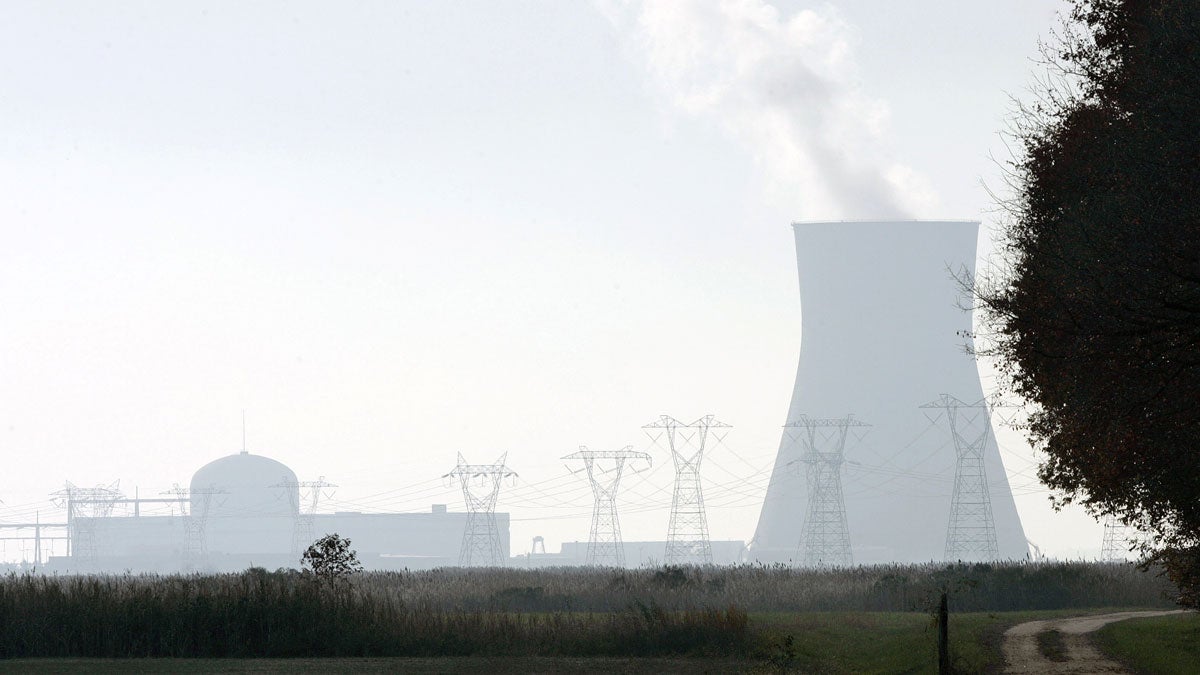New Jersey’s nuclear power subsidy on-hold till new legislative session begins
A controversial bill to subsidize nuclear power plants apparently is dead — at least in the lame-duck session scheduled to end next week.

A large cooling tower and other buildings at the nuclear power site in Salem County can be seen near a farm in Lower Alloways Creek Township, N.J., in rural Salem County Nov. 13, 2007. (Mel Evans, AP, file)
A controversial bill to subsidize nuclear power plants apparently is dead — at least in the lame-duck session scheduled to end next week, with opposition from too many quarters finally taking a toll.
The legislation, pushed by Public Service Enterprise Group for more than a year, would have asked ratepayers to pony up $300 million annually to help prop up three nuclear reactors in South Jersey.
The bill (S-3560), up for a vote in the Senate today, faltered in the lower house when Assembly Speaker Vincent Prieto, a Democrat from Secaucus, balked at posting it. His decision came after a meeting with Gov.-elect Phil Murphy yesterday and rising concern among some lawmakers over the bill being rushed through in the last days of the current session.
PSEG’s CEO, president, and chairman Ralph Izzo has repeatedly warned lawmakers that without the bill the plants would close, arguing that they need some sort of “safety net,’’ similar to lucrative financial incentives handed out to nuclear units in New York and Illinois.
Bill will be back
The apparent shelving of the measure, however, likely will be short-lived. The bill is almost certain to emerge in a much different form in the next legislative term, featuring new incentives to boost renewable energy and other clean-energy programs in New Jersey.
In that event, the unusual coalition of business interests, environmentalists, and consumer advocates is likely to break apart as some of the parties jockey for their own ratepayer-based subsidies for clean-energy programs that could boost energy bills.
Word the bill would not be taken up in the final days of the current term began circulating late yesterday afternoon among opponents of the measure, which included lobbyists for rival energy companies, some of New Jersey’s biggest businesses, consumer advocates, and environmentalists.
Declined to answer questions
PSEG spokesmen declined to answer questions about the bill when asked about it being pulled by legislative leadership. The company said the nuclear reactors in Salem County deserve financial incentives as a reliable source of carbon-free electricity, an argument that swayed two legislative committees in unanimously approving the subsidies.
Neither a spokesman for Prieto nor Murphy responded to questions about why the bill is not coming up in the few days left in the session. A recurring criticism of the bill is that it would crowd out investment in cleaner sources of energy, such as solar and offshore wind — both of which have been pushed by Murphy. Opponents welcomed reports of the bill’s demise — at least for now.
“This is a significant victory for New Jersey energy customers and another clear sign of Assembly Speaker Prieto’s progressive leadership,’’ said Dale Bryk, chief planning officer for the Natural Resources Defense Council. “It’s critical that any nuclear subsidies be done right so that New Jersey consumers, workers, communities, and the environment are protected.’’
Critics faulted the bill as premature, noting the company has acknowledged its units, some partially owned by Exelon, are profitable for the next two years, but could start losing money soon after. The bill would leave it up to the state Board of Public Utilities to decide whether the plant’s finances merited receiving subsidies from ratepayers.
Stepping up the opposition
Before the bill’s fate became known, opponents stepped up lobbying against the measure yesterday afternoon. A coalition of energy companies fighting the bill called it unwarranted, citing a study that concluded the plants have been profitable since their inception, and would likely continue to be so given steps being taken by PJM Interconnection, the regional grid operator, and the federal government to boost energy prices.
Michael Jennings, a spokesman for PSEG, countered that the company has been discussing changes needed by the nuclear sector for years, but none have been implemented. He added the plants would not receive any financial support unless the company could demonstrate a financial need.
In an effort to sway lawmakers, however, opponents were circulating an analyst’s note from Bank of America, which predicted that if the bill passed, they would expect “limited ability for BPU’’ to grant the subsidies.
“I can’t believe that the Legislature intends to award taxpayer subsidies to a company that is profitable,’’ said Dennis Hart, executive director of the Chemistry Industry Council of New Jersey. He cited the analyst’s prediction that the company could begin receiving subsidies, if approved, this year.
PSEG has argued that if the nuclear power plants close, consumers will end up paying higher electric bills because the cost to replace that power will be more than what it costs to generate it from the South Jersey facilities.
WHYY is your source for fact-based, in-depth journalism and information. As a nonprofit organization, we rely on financial support from readers like you. Please give today.




